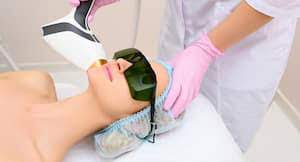In recent years, the field of skincare has witnessed remarkable advancements, propelled by cutting-edge technologies that promise to revolutionize how we approach skincare treatments and products.
Here are some of the emerging technologies and treatments that are shaping the future of skincare:
Stem Cell Therapy
Stem cell therapy has gained significant attention for its potential in regenerative medicine, including skincare. Stem cells are undifferentiated cells that can develop into various types of cells, making them valuable for repairing and regenerating damaged tissues, including skin cells. In skincare, stem cell therapy involves using stem cells derived from plants or human sources to stimulate collagen production, reduce fine lines and wrinkles, and promote skin treatment rejuvenation. This technology holds promise for addressing signs of aging and enhancing skin texture.
Nanotechnology
Nanotechnology involves manipulating matter on an atomic or molecular scale, typically in the range of 1 to 100 nanometers. In skincare, nanotechnology enables the creation of nanoparticles that can penetrate deeper layers of the skin, delivering active ingredients more effectively than traditional skincare formulations. Nanoparticles can encapsulate vitamins, antioxidants, and other beneficial compounds, enhancing their stability and bioavailability. This technology is utilized in products such as sunscreens, anti-aging creams, and acne treatments to improve efficacy and reduce side effects.
Microbiome-based Skincare
The skin microbiome refers to the diverse community of microorganisms (bacteria, fungi, etc.) that reside on the skin’s surface. Emerging research indicates that maintaining a balanced microbiome is crucial for skin health and appearance. Microbiome-based skincare focuses on formulations that support beneficial bacteria and maintain skin barrier function. Probiotics, prebiotics, and postbiotics are being incorporated into skincare products to promote a healthy microbiome, potentially improving conditions such as acne, eczema, and sensitive skin.
AI and Machine Learning
Artificial intelligence (AI) and machine learning algorithms are increasingly being integrated into skincare diagnostics and personalized treatment recommendations. AI can analyze vast amounts of data, including genetic information, lifestyle factors, and skin characteristics, to predict skincare needs and recommend tailored products or treatments. AI-powered devices such as skin analyzers and virtual dermatology platforms are enhancing the accuracy of skincare assessments and helping consumers make informed choices about their skincare routines.
3D Printing
3D printing technology is expanding possibilities in skincare by enabling the creation of customized skincare products and even tissue-engineered skin grafts. Customizable face masks, serums, and moisturizers can be formulated based on individual skin profiles and preferences. In clinical settings, 3D-printed skin grafts are being developed for patients with severe burns or wounds, offering a precise fit and promoting faster healing. This technology holds promise for personalized skincare solutions and advanced wound care treatments.
LED Light Therapy
LED (Light Emitting Diode) light therapy involves using specific wavelengths of light to treat various skin concerns, including acne, inflammation, and signs of aging. LED devices emit light at different wavelengths that penetrate the skin at varying depths, stimulating cellular processes such as collagen production and reducing bacteria that cause acne. Portable LED masks and handheld devices are becoming popular for at-home skincare treatments, offering non-invasive solutions for improving skin tone and texture.
In conclusion, the convergence of scientific research, technological innovation, and consumer demand is driving rapid advancements in skincare. These emerging technologies are not only expanding treatment options but also paving the way for more personalized and effective skincare solutions tailored to individual needs. As these technologies continue to evolve, they hold the potential to redefine skincare practices and elevate standards of skin health and beauty.





Comments